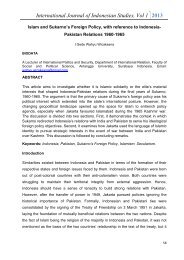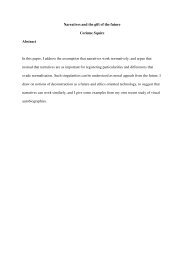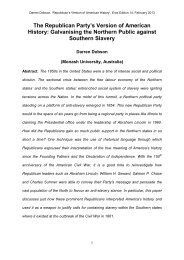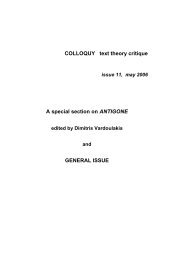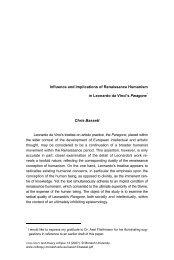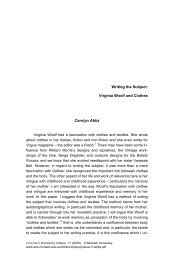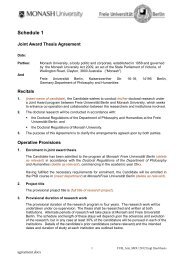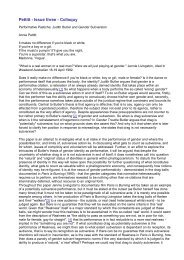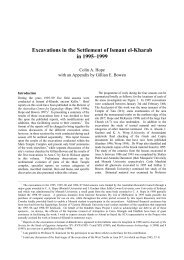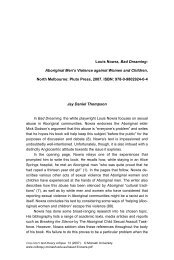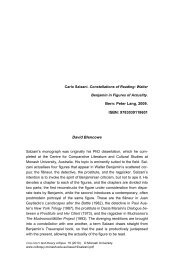The Acknowledgement of Love in Sarah Ruhl's Drama ... - Arts
The Acknowledgement of Love in Sarah Ruhl's Drama ... - Arts
The Acknowledgement of Love in Sarah Ruhl's Drama ... - Arts
Create successful ePaper yourself
Turn your PDF publications into a flip-book with our unique Google optimized e-Paper software.
░ <strong>The</strong> <strong>Acknowledgement</strong> <strong>of</strong> <strong>Love</strong> <strong>in</strong> <strong>Sarah</strong> Ruhl’s <strong>Drama</strong> 17from the world is doomed, a relation that acknowledges the separateness<strong>of</strong> each <strong>in</strong>dividual <strong>in</strong> the world may fare better. Cavell arrives at this suggestionafter th<strong>in</strong>k<strong>in</strong>g about a spectator’s experience <strong>of</strong> watch<strong>in</strong>g the play <strong>in</strong>a theatre. Though spectators are physically separated from the characterson stage, they can put themselves <strong>in</strong> “their present.” 34 <strong>The</strong> act <strong>of</strong> plac<strong>in</strong>goneself <strong>in</strong> the same present as the characters demands that oneacknowledge one’s vulnerability: “I am hidden and silent. In a word, thatthere is a po<strong>in</strong>t at which I am helpless before the act<strong>in</strong>g and suffer<strong>in</strong>g <strong>of</strong>others.” 35 Cavell’s claim is that the experience <strong>of</strong> watch<strong>in</strong>g or read<strong>in</strong>g a playlike K<strong>in</strong>g Lear is an experience analogous to love: “what is revealed is myseparateness from what is happen<strong>in</strong>g to them [the characters]; that I am I,and here. It is only <strong>in</strong> this perception <strong>of</strong> them as separate from me that Imake them present. That I make them other and face them.” 36 Lear’s problemthroughout the play is that he is unable to face Cordelia, to see her assomeone other than his projection <strong>of</strong> her, and to open himself to her lovefor him.Follow<strong>in</strong>g Cavell’s read<strong>in</strong>g <strong>of</strong> K<strong>in</strong>g Lear, I would like to suggest thatwhat Eurydice and Cordelia have <strong>in</strong> common is an unsusta<strong>in</strong>able—albeitheart-rend<strong>in</strong>g—relationship with their fathers that avoids the acknowledgment<strong>of</strong> an <strong>in</strong>expressible (or, <strong>in</strong> Mathilde’s sense, dirty) love. Both playsend with the dashed fantasy <strong>of</strong> an otherworldly union. But <strong>in</strong> dash<strong>in</strong>g thisfantasy, the plays open the way for a more endur<strong>in</strong>g love, which alwaysruns afoul <strong>of</strong> adequate representation. Cavell says <strong>of</strong> Cordelia: “All herwords are words <strong>of</strong> love; to love is all she knows how to do. That is herproblem, and at the cause <strong>of</strong> the tragedy <strong>of</strong> K<strong>in</strong>g Lear.” 37 Certa<strong>in</strong>ly, part <strong>of</strong>Cordelia’s problem <strong>in</strong> the open<strong>in</strong>g scene is that it is impossible for her tospeak her love truly <strong>in</strong> the theatrical sett<strong>in</strong>g her father has set up. After hersisters claim to love Lear above all else, Cordelia is speechless:<strong>The</strong> truth is, she could not flatter; not because she was too proud ortoo pr<strong>in</strong>cipled, though these might have been the reasons, for a differentcharacter; but because noth<strong>in</strong>g she could have done wouldhave been flattery—at best it would have been dissembled flattery.<strong>The</strong>re is no convention for what Cordelia was asked to do. It is thatGoneril and Regan have taken the words out <strong>of</strong> her mouth, but thathere she cannot say them, because for her they are true (“Dearerthan eye-sight, space and liberty”). She is not disgusted by her sisters’flattery (it’s noth<strong>in</strong>g new); but heartbroken at hear<strong>in</strong>g the wordsshe wishes she were <strong>in</strong> a position to say. 38<strong>The</strong> sett<strong>in</strong>g <strong>of</strong> this scene—Lear’s court, filled with spectators—serves tohighlight the impossibility <strong>of</strong> represent<strong>in</strong>g love <strong>in</strong> theatre. Cordelia is aware



